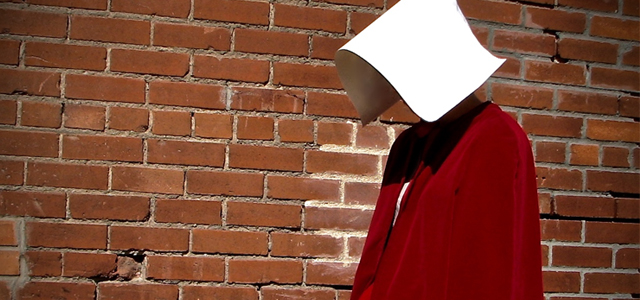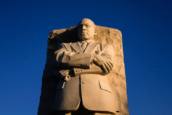
A cautionary tale for all Christians

*Warning the links out of this article may be confronting for some readers*
In the last few weeks TV has been all over the topic of domestic violence and the mistreatment of women at the hands of abusive clergy. With the furore over the statistics and reality of just how prevalent domestic violence is in society, a timely ten part TV series has hit the streaming service SBS On Demand a few weeks ago.
The irony is not lost on many that Margaret Atwood’s tale of forced domestic slavery in The Handmaid’s Tale is not so much speculative fiction as reality being taken to its logical conclusion.
Even after watching the first few episodes of The Handmaid’s Tale, it is shocking how quickly the premise of a brutal theocracy where fertile women are essentially turned into sex slaves becomes the new normal in the context of the series. We keep telling ourselves, it’s a work of fiction, right?
As a Christian, this series was a sobering reminder that the Bible is often used as a means to justify unspeakable evil. And it’s for exactly this reason that every Christian should watch this series.
For some it may be easy to see The Handmaid’s Tale as a cautionary tale and dismiss it as a dystopian nightmare. But we only have to look at recent Australian history and the fact that young Indigenous women were taken from their families and forcefully made to endure slavery, to understand that this is not speculative fiction. The documentary Servant or Slave outlines the ways in which young women were abused and forced into situations out of their control. They often edured sexual abuse with no one to turn to. These sobering realities are part of our history. For those who would like to be enlightened by this particularly heinous part of our recent history, the documentary is available to view on SBS On Demand here.
From it’s opening frames The Handmaid’s Tale introduces us to the handmaid Offred (Elisabeth Moss), and we see glimpses of her life before she was snatched from her family and forced into slavery in Gilead. She was once happily married with a daughter and successful job before being ripped from her family and everything she knew to serve as a handmaid to Commander Frederick Waterford (Joseph Fiennes) and his wife Serena Joy (Yvonne Strahovski). She also had to forfeit her real name for the name “of” her commander (hence Of-fred). The reasoning behind her enforced slavery is that she is one of a group of select women who are able to bear children in a society where infertility is the norm. So once a month she is forced to endure “the ceremony” — sexual abuse that uses the Biblical text from Genesis 30 as its liturgy. You see in Gilead, the Bible is used in its literal sense to wield power and control over women who can bear children.
Offred’s real name is June. And we become increasingly aware that she holds onto this information in a quietly rebellious way as she goes about her daily chores for her household. Her internal monologue reveals that this cannot be her life and she will do everything to escape it. At any cost.
We learn about Offred’s daily reality; that she must walk past “the wall” where enemies of the state — clergy, gay people and doctors — are routinely executed for taking a stand against the theocratic rules of Gilead. Pieces of her story start to become uncomfortably familiar when society is viewed in such an extreme way.
It may be easy to dismiss The Handmaid’s Tale as just another dark, binge-worthy series and as a work of fiction. This will fall away when you realise that at the time of writing The Handmaid’s Tale Margaret Atwood used real-world parallels to craft her work. Unfortunately we don’t live in an egalitarian society and the ways in which women are oppressed and abused in society are ever-present; female genital mutilation, sex trafficking and even women’s reproductive rights all become part of Atwood’s unfortunate narrative. This is not speculative fiction, it is all too real.
Margaret Atwood was recently interviewed about The Handmaids Tale by Sojouners magazine and she said that far from being anti Christian, the book and series is about how the Bible and faith can be abused, but also how it can spur us into activism. This is why the series presents an important look at real-world issues through the lens of a fictionalised world.
“So you can have bad iterations and you can also have the iteration in which people have got too much power and then start abusing it,” explains Atwood to Sojourners. “But that is human behaviour, so you can’t lay it down to religion. You can find the same in any power situation, such as politics or ideologies that purport to be atheist. Need I mention the former Soviet Union? So it is not a question of religion making people behave badly. It is a question of human beings getting power and then wanting more of it.”
For Christian’s the book and series should make us feel very uncomfortable. Abuse of power in any form should make us advocates for a better solution.
We are used to hearing encouraging sermons based on Bible verses, but in looking at how humanity has sinned and warped our view of justice, we need to understand how hope and the light of Christ can offer freedom instead of oppression.
The Handmaids Tale serves as an important starting point to this discussion.
Adrian Drayton




























































